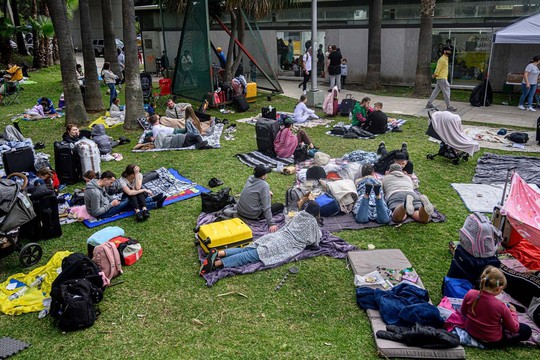Refugees wait in Tijuana, Mexico, for entry into the United States.
Photo Getty Images
There are well over a half million displaced people in the United States, and the number is growing. To the majority and the powerful they are a nuisance, and for some, not even human, a subspecies. They, the displaced, know it. Those of us on the other side of the thin line, can feel the current, the unease, the threat. Or should, Richard Ward, a writer, notes.
As a further result of the economic collapse, Walgreens and stores like it have had to deal with rampant shoplifting. Ordinary items have been for some time secured behind locked, plastic shields. To get a tube of toothpaste or a bar of soap you have to buzz a store worker, as if you wanted to look at a watch, or a camera. Before these security measures were instituted about eight months ago, people would brazenly take things and walk out. Dental items, soap, and shampoo were among prized commodities, either to be used or sold on the street. Store workers were instructed not to stop them.
Now, Walgreens is a high-security zone, with two, sometimes three, armed IPS guards stationed permanently in the store, their shiny, black, cop-like vehicle parked conspicuously in front, the guards themselves neat, fit-looking young men in brown or khaki uniforms, equipped with all the accessories. Theirs is an impressive, intimidating presence, and anyone would think twice about pulling something. Most customers avoid looking at them directly, glancing briefly, instinctively reacting to the display of physical threat, even if it’s in the form of “protection.” The message is clear. The guards, for their part, are pleasant enough, and approachable. I am, depending on my mood, bitterly amused or hostile at their presence. For me they are a deceptively benign manifestation of Orwell’s boot stamping on a human face — forever.
These proliferating security zones, formerly known as “stores,” are perfectly logical and normal within the parameters of the rampaging capitalist system that defines life in the United States today, and most people likely take it for granted. A child growing up now perceives the situation as perfectly ordinary, in the way that same child sees as normal our diminishing natural world. There is no experience of what was before.
Toxicity, hostility, and fear mark our time, a greasy ride to some dreadful terminus, already there, mostly, but still slipping, faster than we ever imagined. Now, when I have to go to this place I used to know as my neighborhood pharmacy, I feel diminished, saddened, and angry. I see other human beings, beaten down, fearful, as if living in a war zone, which, in a sense, they are. I am among them, with them.
In an odd way, Walgreens was a kind of haven, or safe zone, not much different from a school, church, mosque, synagogue, or hospital. No more. The displaced are now mostly out of sight, the ones deemed acceptable are allowed to enter, but surveilled. No one is above suspicion.

Walking back from Walgreens, down Central Avenue, heading home, is a trip through a small purgatory. For years there have been numerous shuttered stores and the number is increasing. The displaced, the lost, the addicted, the mentally ill, a lot of them young, are commonplace on this heartland road, old Route 66. “Running through the heart of the city along Central Avenue, this historic highway leads travelers through some of the city’s most beloved neighborhoods,” says an official Albuquerque website.
I’ve gotten to know some of the people on Central. Sometimes we nod hello. Occasionally we exchange a few words. At times I’ll give someone money. Nothing praiseworthy or virtuous about this, just another form of communication. Sometimes they’re in a very bad way. The other evening walking back in the cold I passed a diminutive Native woman in a flimsy brown coat and pajama bottoms screaming at her reflection in the window of a shuttered store, vile, self-abasing things, pounding her small fists on the plate glass.
It was disturbing and frightening, and I picked up my pace. But there it was. Staring long enough at our own reflections and what looms behind us, we’d be screaming too. Or should be.
read more in our Telegram-channel https://t.me/The_International_Affairs

 10:12 31.12.2023 •
10:12 31.12.2023 •























